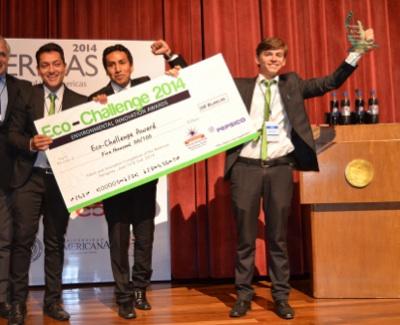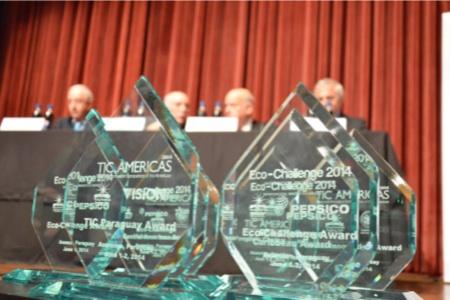PepsiCo Sponsors Young People Seeking Solutions to Environmental Challenges
The 2014 Eco-Challenge helps empower young people to develop environmental solutions.
Thirty bright young minds gathered in Asuncion, Paraguay on June 1-2 to share innovative solutions to environmental challenges.
The 30 were finalists in the 2014 Eco-Challenge, a competition in which young people from Latin America and the Caribbean developed and submitted entrepreneurial ideas and programs to solve environmental problems confronting communities, countries or regions in Latin America.
The program was sponsored by PepsiCo and the Young Americas Business Trust, a nonprofit corporation that works in cooperation with the Organization of American States (OAS) to promote social and economic development in the Western Hemisphere and around the world.
“The Eco-Challenge is about tapping into the energy and passion of young people to find economically viable ways to protect the environment,” said Luis Montoya, president, PepsiCo Latin America Beverages. “It’s a great way for PepsiCo to advance our Performance with Purpose vision of doing the right things for people and communities around the world while delivering great performance.”
Eco-Challenge Competition: 1,400 Participants
Beginning last September, more than 1,400 participants between the ages of 13 and 35 from 30 countries registered for this year’s Eco-Challenge through online submissions that included an implementation strategy and plan with target audiences, a 6-to-12 month budget, prototypes and supporting materials such as project videos or websites.
Applications were wide-ranging. “Many of the proposals we received were ideas or concepts, but a lot of them are actually projects that are already being implemented,” said Gabriela de la Garza, sustainability senior manager at Pepsi-Co Latin America Beverages.
Applicants could receive business development assistance through the Young Americas Business Trust’s Business Opportunities Online Training (BOOT Camp), which includes a variety of information including training videos and live online training.
“When the application period was over, approximately 100 international judges, including PepsiCo employees and various subject-matter experts from industry, academia and the non-profit sector, reviewed the project submissions,” said de la Garza.
“Twelve teams were selected as finalists from all the submissions,” she said. “The 12 teams received feedback from the judges and they had one month to finalize their projects before going to Paraguay for the final judging.”
In Paraguay, the 12 teams set up booths to display their projects to competition attendees. They attended training sessions, roundtables, entrepreneurial debates, leadership sessions and networking opportunities. They also had an opportunity to give practice presentations to several PepsiCo subject-matter experts who provided feedback and recommendations.
A member from each team then had 40 minutes to present their program and answer questions before a five-judge panel comprised of PepsiCo employees. The judging was based on criteria such as innovation and feasibility of implementation.
This year four winning teams were selected and each team received $5,000 to help fund their project. Winners will also receive support services through the Young Americas Business Trust in order to strengthen and enhance their projects.
De la Garza and the other PepsiCo judges hope to follow up with the teams in the future.
“PepsiCo’s support at the Eco-Challenge is tremendous, and the experts are eager to offer advice to the bright young people,” said de la Garza. “It’s very exciting to see these gifted young entrepreneurs take an idea and put it into practice. This is the fifth year that PepsiCo has supported the Eco-Challenge and we have seen some very impressive and creative problem-solving programs,” said de la Garza.
This year’s Eco-Challenge was part of the official activities of the 44th annual meeting of the Organization of American States.
The Winning 2014 Eco-Challenge Projects
Greenetics (Ecuador) seeks to install computer labs in schools through the use of recycled computer equipment considered outdated. This would reduce electronic waste while enabling its use for educational purposes.
Ilumexico (Mexico) targets the social development of the most marginalized communities in Mexico by providing electrical energy through unconventional means. In doing so, they have developed a solar technology that is being distributed in the furthest corners in Mexico.
Tambran by Tamara (Grenada) utilizes the waste materials from companies to produce wearable, contemporary, unique, one-of-a-kind fashion accessories to improve the aesthetics, self-confidence and social appeal of the modern individual.
Sistema Permacultural (Guatemala) promotes sustainable farming of cold land Tilapia and the construction of greenhouses for growing horticultural products, such as tomatoes, peppers, cucumbers and strawberries with the aim of promoting sustainable agriculture and the use of compost.



